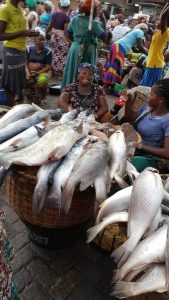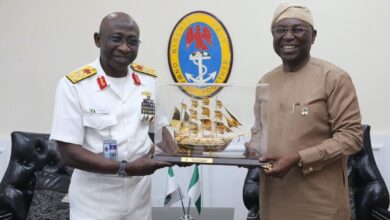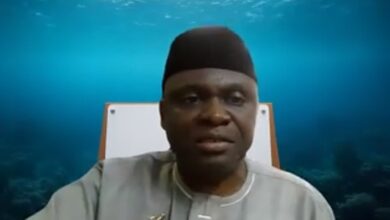

Once thriving with abundant marine life, Nigeria’s coastal waters are now seeing a troubling decline in fish stocks, leaving local fishermen struggling to sustain their livelihoods.
A new study has revealed that overfishing, climate change, and pollution are driving a growing crisis in the nation’s fishing industry, leading to soaring prices and economic hardship for those who depend on the sea for survival.
The study, conducted by marine researchers, highlights a drastic reduction in fish populations, with species that were once plentiful becoming increasingly scarce.
Fishermen in Lagos, the country’s largest coastal city, say they now spend more time at sea while catching significantly fewer fish than in previous years. Many attribute this decline to unregulated industrial fishing, habitat destruction, and rising ocean temperatures, which have disrupted breeding patterns.
A recent study led by Mary Opeyemi Adebote, one of Nigeria’s YALI awardee, sheds light on the alarming decline in fish stocks, the struggles of local fishermen, and what this means for Nigeria’s economy and food security.
Adebote’s research took her to Erepoto Fishing Community in Epe and Yovoyon Fishing Village in Badagry, where she interviewed fishermen about their experiences. Their responses paint a bleak picture.
“We used to catch enough fish to sell and feed our families. Now, we return with barely anything,” said Baba Sevyon, a fisherman in Epe.
The numbers back up their fears. The Nigerian Fish Market Report projects a sharp drop in fish consumption, estimating a decline to 194,000 metric tons by 2028. Since 2019, fish demand in Nigeria has been shrinking at an annual rate of 7.1%—a worrying trend for a country where millions depend on seafood for protein.
From the survey, fishermen listed overfishing, unregulated industrial trawling, and environmental changes as major threats to their livelihoods. Many reported that fish are not only becoming scarcer but are also smaller in size, signaling the depletion of breeding populations.
At the Oluwo Modern Fish Market in Epe, traders struggle to source fish at reasonable prices.
“Prices have doubled because we can’t get enough supply. Customers complain, but we have no choice,” said Mama Tinu, a fish vendor.
One of the biggest concerns raised was the unchecked activities of large commercial trawlers, which exploit the waters at an unsustainable rate. These industrial fishing vessels, often backed by foreign companies, scoop up vast amounts of fish, leaving little for small-scale fishermen.
“They invade our waters with their big boats, catch everything, and sometimes destroy our nets. Who is protecting us?” asked a frustrated fisherman in Badagry.
Adding to the crisis is the presence of foreign fishermen, particularly from the Republic of Benin, who enter Nigerian waters without regulation. Many operate without licenses, further reducing the available fish stock for local communities.
Aside from depleting fish stocks, the rising cost of fuel and fishing gear is making the trade unprofitable for many.
“We can’t afford to maintain our boats. Fuel is expensive, nets get damaged, and the catch isn’t enough to cover costs,” lamented a fisherman in Epe.
She warns that if no action is taken, Nigeria could face a full-blown fish crisis, leading to job losses, food shortages, and economic strain. The future of Nigeria’s fishing industry depends on immediate action. Without intervention, the cultural heritage and a vital economic sector may disappear, particularly the livelihoods of thousands of Nigerians.
“We used to return from the sea with boats full of fish, but now we barely catch enough to sell,” lamented Suleiman Adeyemi, a fisherman in Lagos.
“The fish are disappearing, and the ones we do find are smaller and harder to catch.”
As local fish supplies dwindle, the cost of seafood has surged, putting additional strain on consumers. Market vendors report that prices for staple fish species such as tilapia and mackerel have nearly doubled in the past year. This has made fish—once a primary source of protein for many Nigerian families—less accessible to low-income households.
Experts warn that if urgent measures are not taken, Nigeria’s fishing industry could face long-term collapse. The study calls for stricter regulations on industrial fishing, greater investment in sustainable aquaculture, and policies to curb pollution in coastal areas.
Environmentalists also stress the need for community-driven conservation efforts to protect marine biodiversity.
“We need to balance economic needs with sustainability,” said marine biologist Dr. Chika Okonkwo. “If we don’t act now, future generations will inherit empty oceans.”
For Lagos fishermen, the crisis is not just about fish—it is about survival. Many are considering abandoning the trade altogether, seeking alternative livelihoods in an already challenging job market. Without intervention, Nigeria risks losing not just a crucial industry, but a way of life that has sustained coastal communities for generations.
Once thriving with abundant marine life, Nigeria’s coastal waters are now seeing a troubling decline in fish stocks, leaving local fishermen struggling to sustain their livelihoods.
A new study has revealed that overfishing, climate change, and pollution are driving a growing crisis in the nation’s fishing industry, leading to soaring prices and economic hardship for those who depend on the sea for survival.
The study, conducted by marine researchers, highlights a drastic reduction in fish populations, with species that were once plentiful becoming increasingly scarce.
Fishermen in Lagos, the country’s largest coastal city, say they now spend more time at sea while catching significantly fewer fish than in previous years. Many attribute this decline to unregulated industrial fishing, habitat destruction, and rising ocean temperatures, which have disrupted breeding patterns.
A recent study led by Mary Opeyemi Adebote, one of Nigeria’s YALI awardee, sheds light on the alarming decline in fish stocks, the struggles of local fishermen, and what this means for Nigeria’s economy and food security.
Adebote’s research took her to Erepoto Fishing Community in Epe and Yovoyon Fishing Village in Badagry, where she interviewed fishermen about their experiences. Their responses paint a bleak picture.
“We used to catch enough fish to sell and feed our families. Now, we return with barely anything,” said Baba Sevyon, a fisherman in Epe.
The numbers back up their fears. The Nigerian Fish Market Report projects a sharp drop in fish consumption, estimating a decline to 194,000 metric tons by 2028. Since 2019, fish demand in Nigeria has been shrinking at an annual rate of 7.1%—a worrying trend for a country where millions depend on seafood for protein.
From the survey, fishermen listed overfishing, unregulated industrial trawling, and environmental changes as major threats to their livelihoods. Many reported that fish are not only becoming scarcer but are also smaller in size, signaling the depletion of breeding populations.
At the Oluwo Modern Fish Market in Epe, traders struggle to source fish at reasonable prices.
“Prices have doubled because we can’t get enough supply. Customers complain, but we have no choice,” said Mama Tinu, a fish vendor.
One of the biggest concerns raised was the unchecked activities of large commercial trawlers, which exploit the waters at an unsustainable rate. These industrial fishing vessels, often backed by foreign companies, scoop up vast amounts of fish, leaving little for small-scale fishermen.
“They invade our waters with their big boats, catch everything, and sometimes destroy our nets. Who is protecting us?” asked a frustrated fisherman in Badagry.
Adding to the crisis is the presence of foreign fishermen, particularly from the Republic of Benin, who enter Nigerian waters without regulation. Many operate without licenses, further reducing the available fish stock for local communities.
Aside from depleting fish stocks, the rising cost of fuel and fishing gear is making the trade unprofitable for many.
“We can’t afford to maintain our boats. Fuel is expensive, nets get damaged, and the catch isn’t enough to cover costs,” lamented a fisherman in Epe.
She warns that if no action is taken, Nigeria could face a full-blown fish crisis, leading to job losses, food shortages, and economic strain. The future of Nigeria’s fishing industry depends on immediate action. Without intervention, the cultural heritage and a vital economic sector may disappear, particularly the livelihoods of thousands of Nigerians.
“We used to return from the sea with boats full of fish, but now we barely catch enough to sell,” lamented Suleiman Adeyemi, a fisherman in Lagos.
“The fish are disappearing, and the ones we do find are smaller and harder to catch.”
As local fish supplies dwindle, the cost of seafood has surged, putting additional strain on consumers. Market vendors report that prices for staple fish species such as tilapia and mackerel have nearly doubled in the past year. This has made fish—once a primary source of protein for many Nigerian families—less accessible to low-income households.
Experts warn that if urgent measures are not taken, Nigeria’s fishing industry could face long-term collapse. The study calls for stricter regulations on industrial fishing, greater investment in sustainable aquaculture, and policies to curb pollution in coastal areas.
Environmentalists also stress the need for community-driven conservation efforts to protect marine biodiversity.
“We need to balance economic needs with sustainability,” said marine biologist Dr. Chika Okonkwo. “If we don’t act now, future generations will inherit empty oceans.”
For Lagos fishermen, the crisis is not just about fish—it is about survival. Many are considering abandoning the trade altogether, seeking alternative livelihoods in an already challenging job market. Without intervention, Nigeria risks losing not just a crucial industry, but a way of life that has sustained coastal communities for generations.











